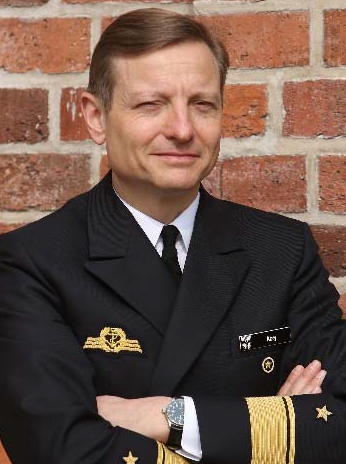Rear Admiral (L.H.) Abry
Operation ATALANTA Deputy Commander
20 January 2019—EU NAVFOR Somalia Operation ATALANTA welcomed a new Deputy Commander this week, upon the departure of former Deputy Commander, Rear Admiral Giovanni Battista Piegaja. New Deputy Operation Commander, German Rear Admiral L.H. Wilhelm Tobias Abry will serve with Operation ATALANTA, supporting Operation Commander Major General Antonio Planells Palau for the next six months.
In this Question and Answer session, Lieutenant Commander Marcel Nguyen van (German Navy) sits down with the Rear Admiral to speak with him about #OpATALANTA.
Listen to the full interview below:
[audio mp3="/sites/default/files/featured_images/2020/01/Interview-RA-Abry.mp3"][/audio]
L.C. Nguyen van: Admiral, would you please introduce yourself?
R.A. (L.H.) Abry: Sure, my name is Rear Admiral Abry. I was born in Germany in Helmstedt, which is a very small town. There, I am the Commander of the Naval Academy in Germany in Flensburg. It is a very nice area, and they (the academy) are responsible for training and education of all midshipman of the German Navy. Currently, I'm posted here in Rota, Spain in a lovely place in the Operational Headquarters of Operation ATALANTA as Deputy Operation Commander.
L.C. Nguyen van: And Admiral, how are you connected to ATALANTA?
R.A. (L.H.) Abry: Well, I of course was deployed many times in Operation ATALANTA as a Commanding Officer and also at the Force Headquarters at sea—not here in Rota. So, I have some experience in this Operation.
L.C. Nguyen van: And what does Operation ATALANTA mean to you?
R.A. (L.H.) Abry: First of all ATALANTA is a very successful operation, as it ensures freedom of navigation in the Horn of Africa region. It also ensures humanitarian aid to the people of Somalia with regards to the support of the United Nations World Food Programme.
Secondly, ATALANTA is a successful operation because we were able to contain the threat of piracy and we suppressed piracy, together with our different stakeholders of NATO of the coalition maritime forces in the area but also in coordination and good communication with the merchant shipping industry.
And third, I think it's very important for me from a European perspective, that ATALANTA shows that Europe can deliver strategic effects in the Horn of Africa region and the operation is very successful in tackling maritime dimension security risks.
L.C. Nguyen van: And maybe you can summarize in a few words: Why is this mission so important?
R.A. (L.H.) Abry: The mission is so important because we need to ensure sea lines of communications. Sea lines of communications are directly connected with the security and prosperity of all of our nations. ATALANTA is so important because we have to contribute to the stability of Somalia. And therefore there is a need for us to support the World Food Programme. And those strengths make it crystal clear that ATALANTA will stay and remain a critical operation in this area.
Operation ATALANTA deters piracy and armed robbery off the Somali coast, protects World Food Programme-chartered vessels, monitors fishing activity in the region and supports others EU missions and international organisations.
